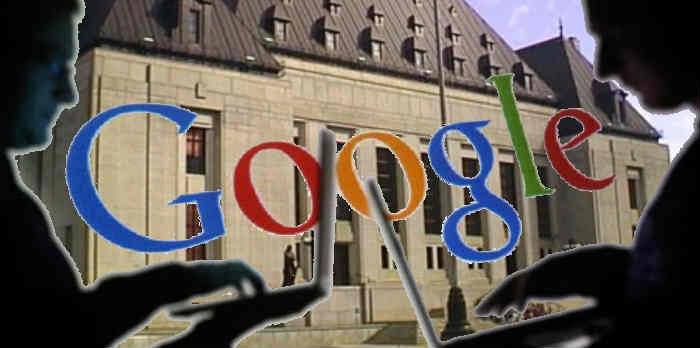Google’s Interest in the Case
Elementary, dear Watson!

The
CBC reports: “Armed with the support of human rights and civil liberties organizations, Google is at the Supreme Court of Canada (SCC) on Tuesday to appeal a ruling it says poses a threat to freedom of expression and access to information both in Canada and around the world.”
Needless to say, the legal minds are battling it out in court, specifically asking the SCC to overturn an earlier ruling in that case made in the Province of British Columbia.
What’ the Issue?
What’s the issue, you may ask. In short, it concerns the use of court orders in one country (like Canada) to effectively curtail or prohibit internet advertising or sale of services or products in another, even when such services or products are not illegal in that other country.
The specifics of the case concern only a small and relatively unimportant case. However, the wider consequences of the case could be immense. You might say that one country (Canada) is trying to force its own standards onto others by preventing Google (G) from allowing people in other countries to even see a specific ad that originates from a web site hosted in Canada.
Clearly, whatever the SCC decides in that case would only apply to this country. However, if other countries were to follow suit and establish similar rules, who knows what the end result may be?
So, what do you think? Is the internet a “free-for all” or should individual countries be allowed (or even encouraged) to impose their standards onto other countries as well? I think the question (and answer) will become clearer if one considers the two possible scenarios, both considering the extremes, one way or another:
Scenario One: Yes, ”Country A” can impose its standards on the rest of the world
With 200 or so countries in today’s world, it would not be difficult to find one or more jurisdictions that would or could prohibit any or all internet “products,” i.e. web sites from any other country of origin. Some of that type of censorship is already in place at certain nations.
The scenario that makes this attitude a “world standard” could just about kill the internet altogether. Any “sanctioned” censorship would likely become a rampant way to invoke blackmail, back-door payments, possibly crime, and certainly much consternation all around.
Just to give an (entirely hypothetical) example: Internet users in Canada could only see web sites from countries that “like” it. And if there were none of such, any “surfer” in Canada could not even see any web site from outside the country.
Scenario Two: No, ”Country A” cannot impose its standards on the rest of the world
It’s probably like bringing owls to Athens, when stating that I favour this scenario. Just look at history from medieval times. When Johannes Gutenberg’s (1398 – 1468) printing press became widely available, mankind moved from the medieval epoch to the Renaissance. Novel ideas could be made available to see and read about everywhere, science flourished and knowledge became available to people around the globe. Scientific societies got created to present, discuss and verify observations, develop new inventions and so forth.
Not only has technology advanced tremendously but also the health sciences. Two thousand years ago, average life expectancy was in the order of 30 years. Around 1500 it had risen to perhaps 50 years (at least in parts of the western world) and now it’s somewhere in the neighborhood of 80 years.
Those developments are closely linked to the supply of (cheap) energy and its use via technology. For example, instead of backbreaking work like manually digging up the ground, a small bulldozer does that while its operator could sip a mug of coffee. A few liters of gasoline or diesel oil can so replace the manual labour of a slew of people – and perform the task much faster as well.
But let’s come back to the issue at hand, namely G’s case before the court.
Google’s Interest in the Case
Though Google was not even one of the original parties in that particular court case but being a widely used search engine, it took it upon itself to defend free internet access. As the CBC report says: “According to documents filed by Google's legal team, a decision made by the B.C. Supreme Court effectively issues ‘a permanent, mandatory, worldwide injunction … intended to silence speech regarding the existence of publicly accessible websites on the internet."
Now, to be quite frank, G’s penchant for recording everything – in perpetuity – has some people worried too – not without reason. G probably knows what you ate for dinner last night (even if you don’t remember yourself) and every step you took or where you drove your (GPS-enabled) car between noon and 1 pm. No doubt, G’s and other’s search routines are truly phenomenal though not necessarily unbiased. Using G’s number of references to my name, I ought to be quite famous now – unless they just refer to last night’s dinner of mine.
Perhaps G really has no business collecting all that information. Perhaps even G does not know how to “to make hay” from that stream of information other than by following (secret) government decrees. No doubt, such demands exist and G does quite well following such orders. Not surprisingly then, G’s legal department is one of its most important business assets. And it appears to be a rising star as more jurisdictions come knocking on its doors.
If there is to be a free, uncontrolled and unbiased internet access to all people everywhere, I think that search engine queries ought to provide unbiased results as well. In this context, G’s involvement in that case may become a double-edged sword. Freedom to pursue an individual’s dream is good and any rules of conduct ought to apply equally to all parties, including the data collectors and search engine providers. Therefore, it might be a legit question to ask the latter a simple question:
Do you also intend to provide unbiased search results?"
Whatever the SCC will be deciding may have far-reaching consequences. Whatever the outcome will be, as Sherlock might have proclaimed:
Elementary, dear Watson!
Dr. Klaus L.E. Kaiser -- Bio and
Archives |
Comments
Dr. Klaus L.E. Kaiser is author of CONVENIENT MYTHS, the green revolution – perceptions, politics, and facts Convenient Myths

